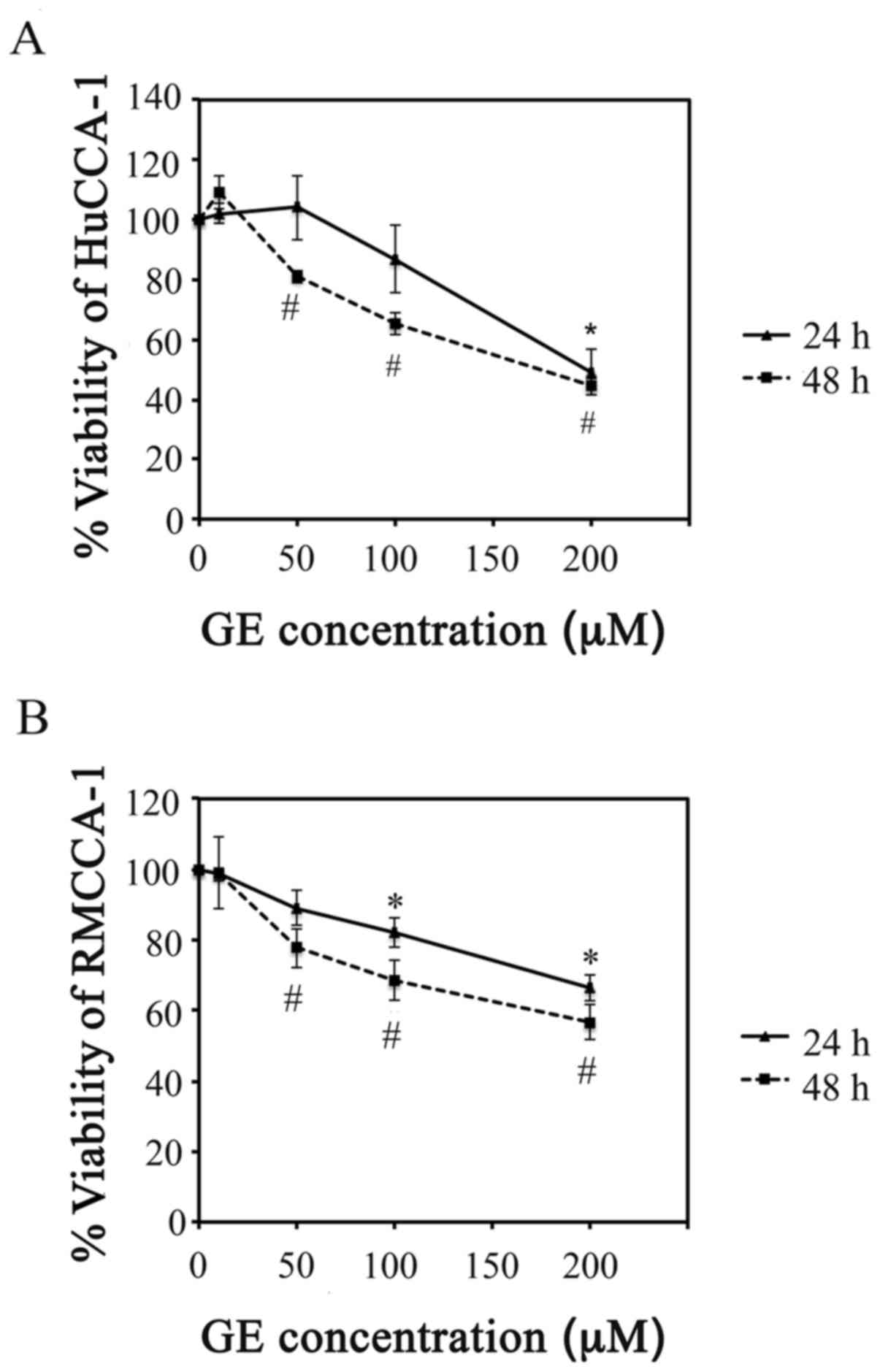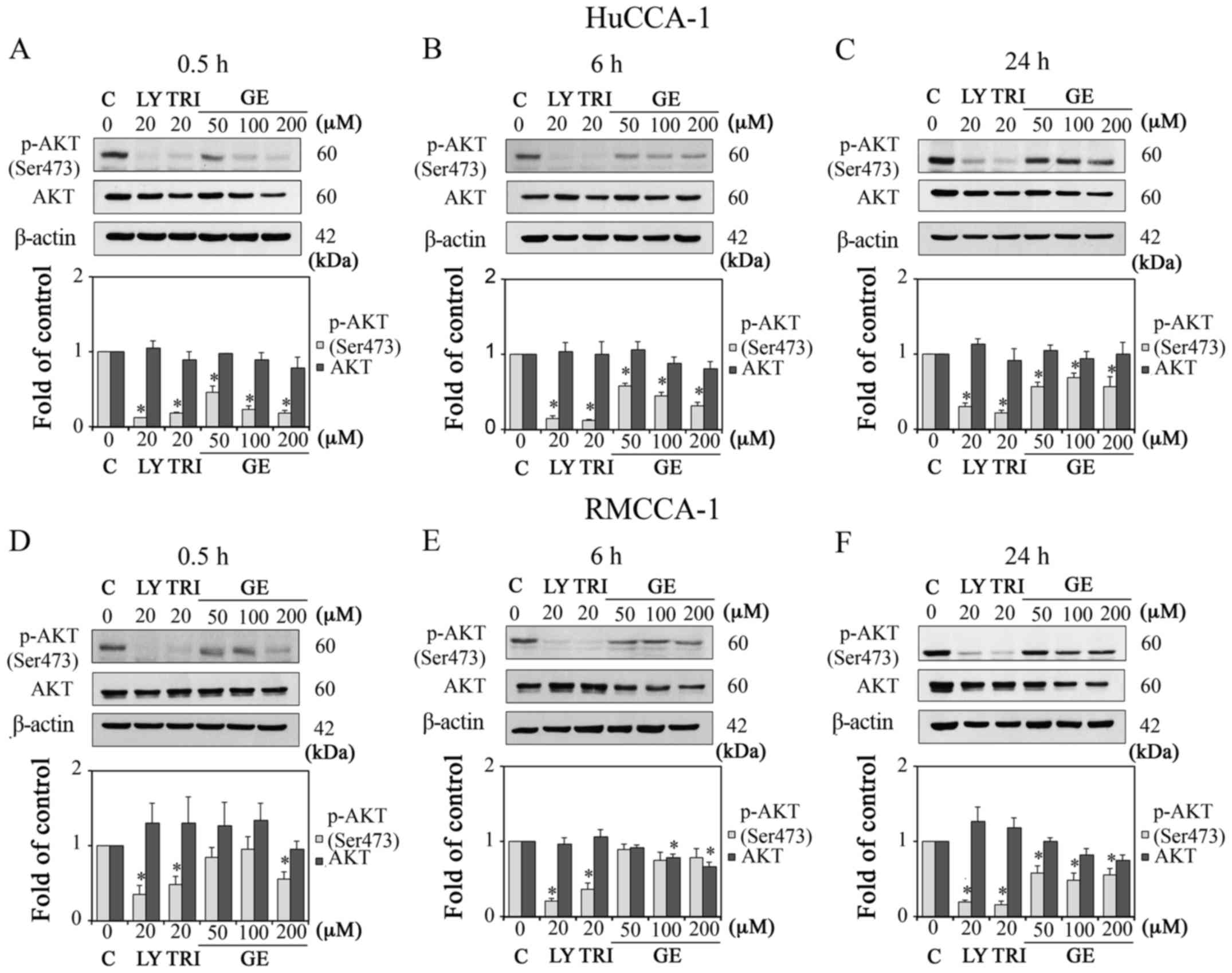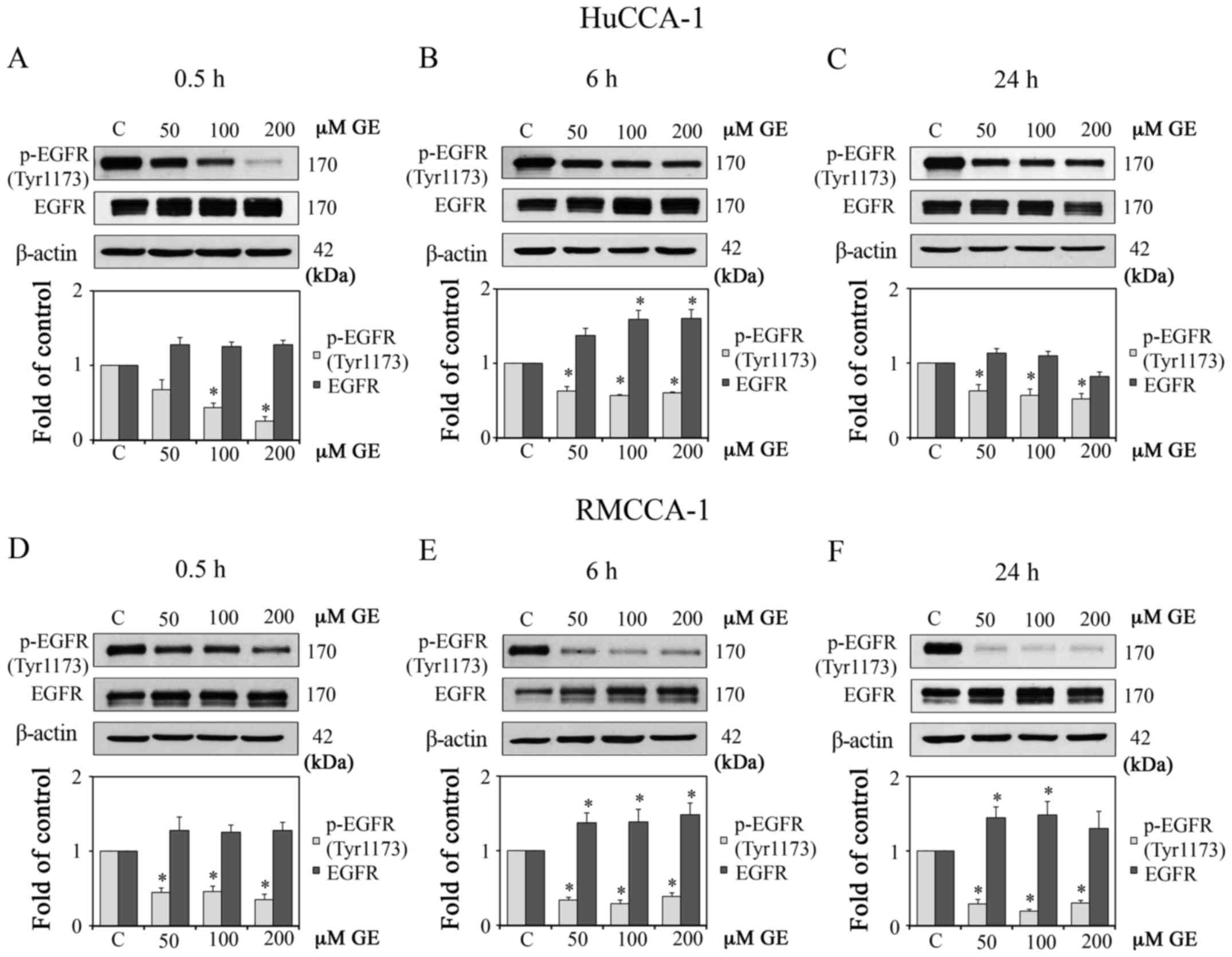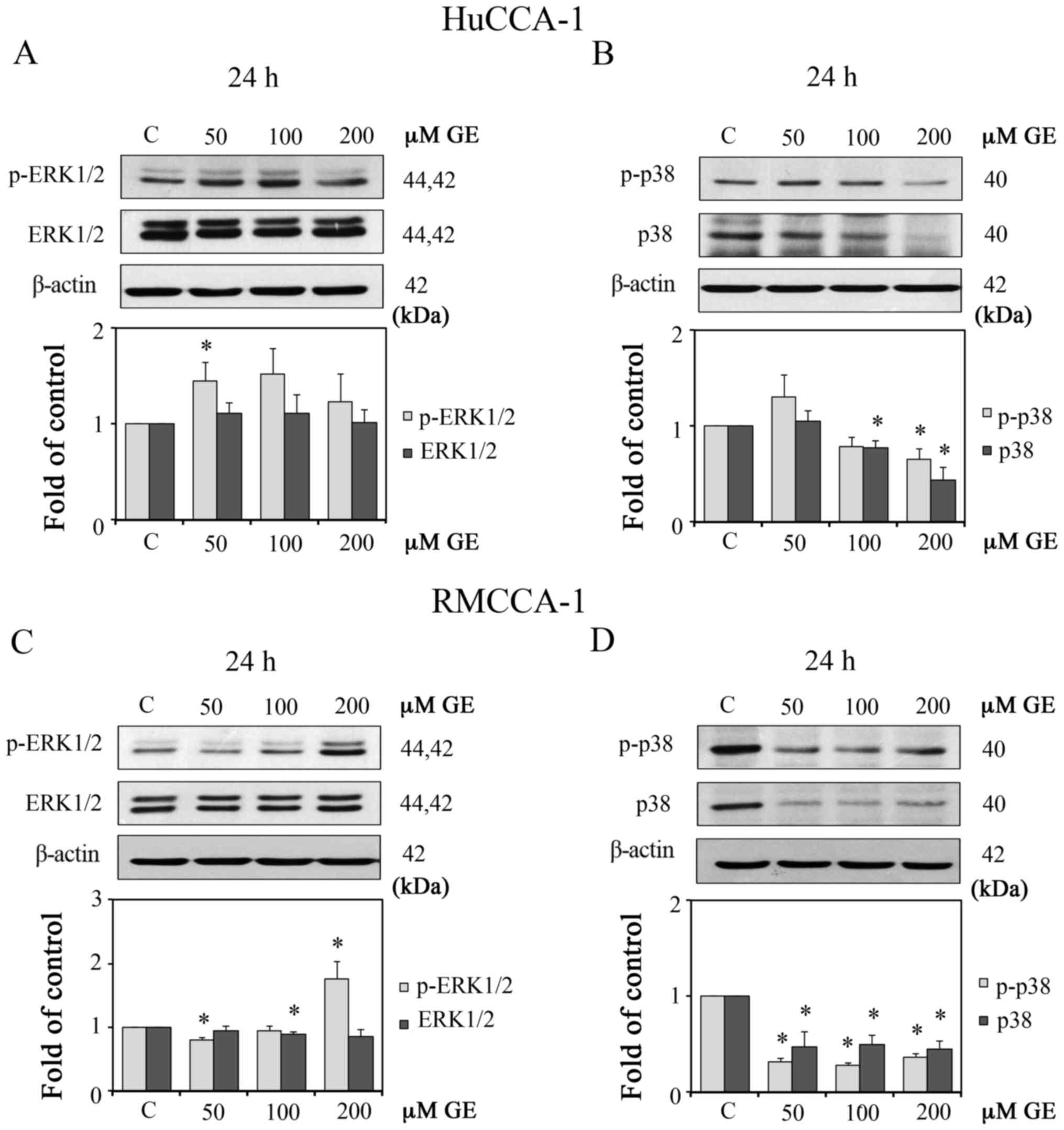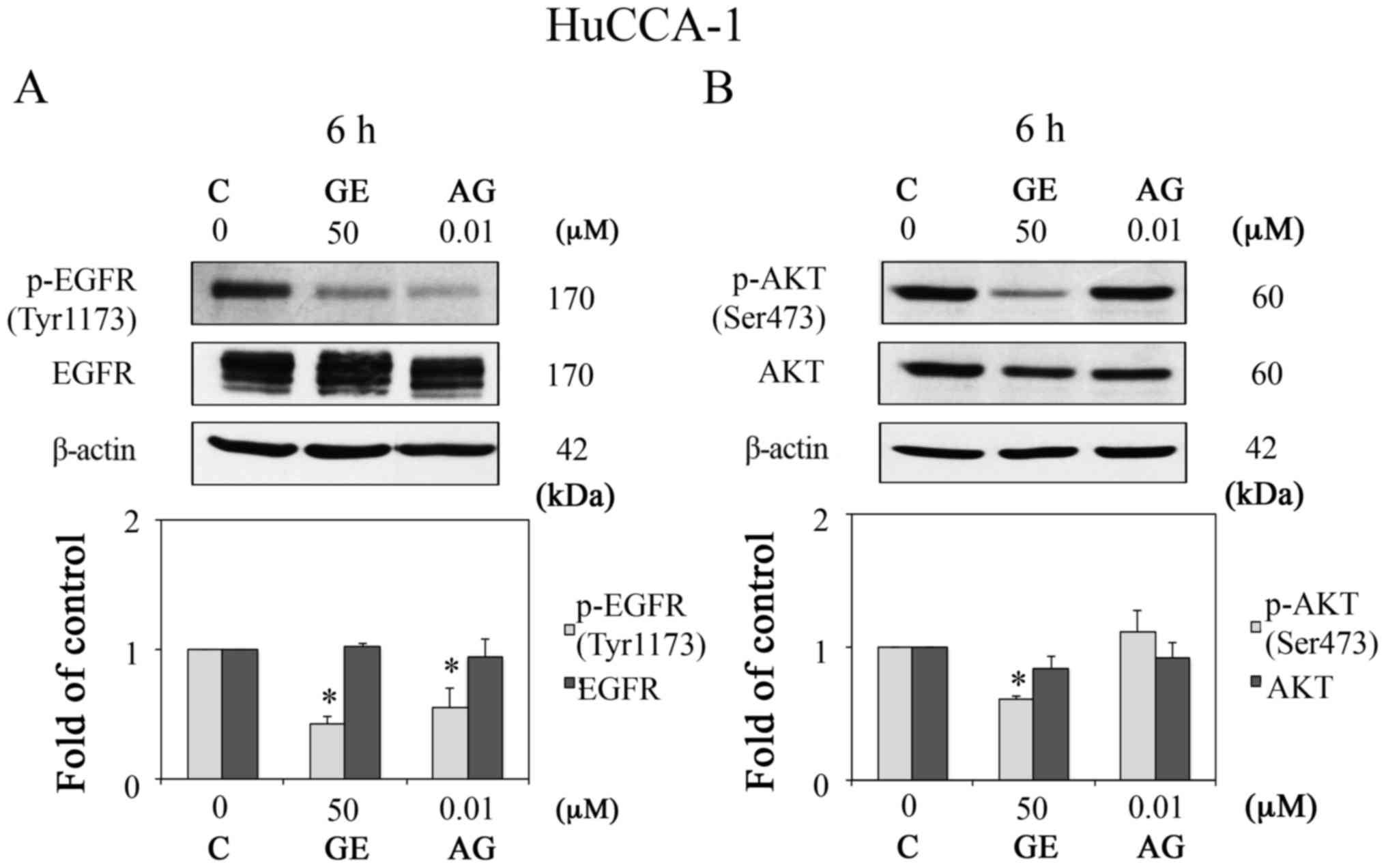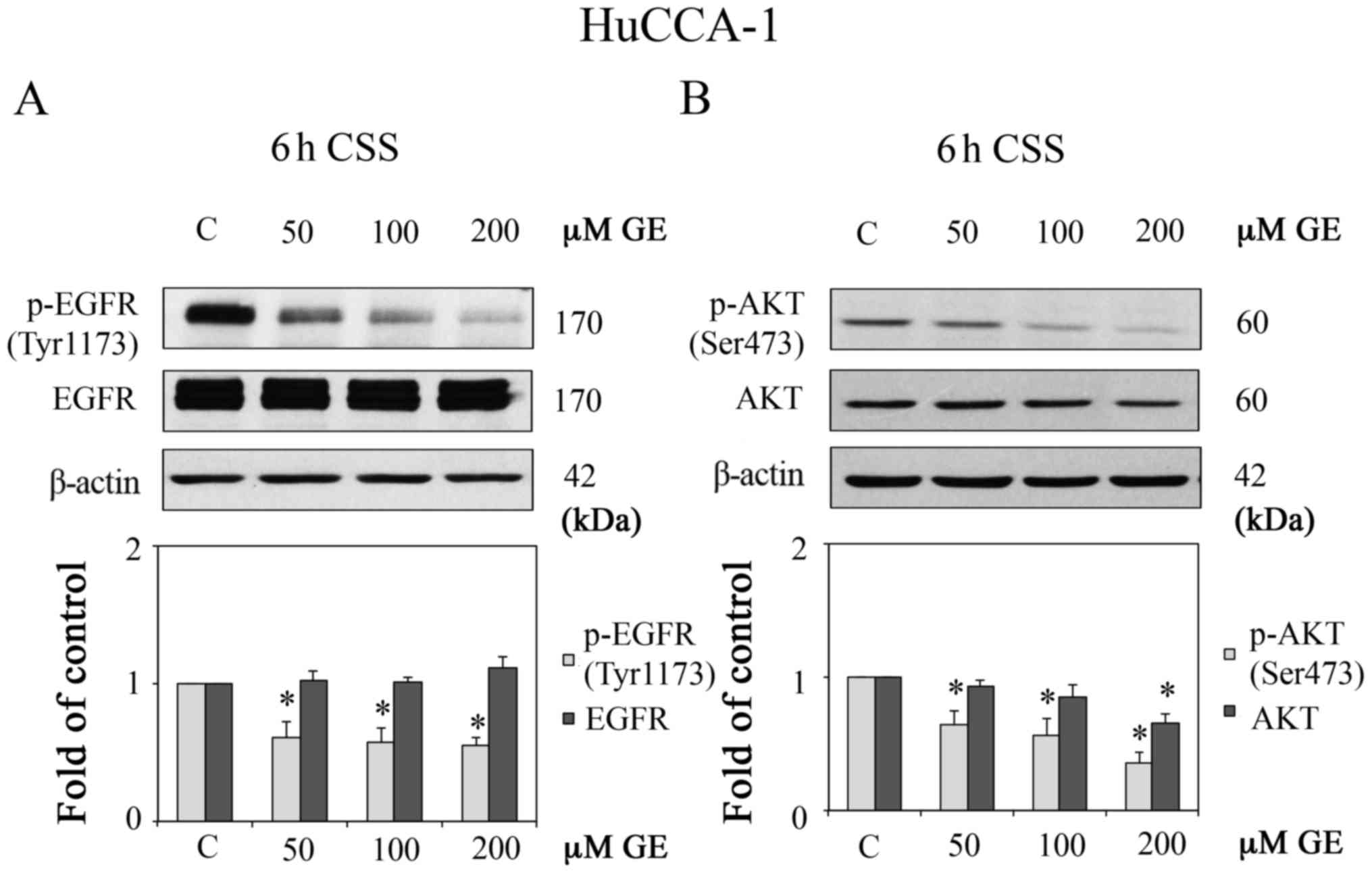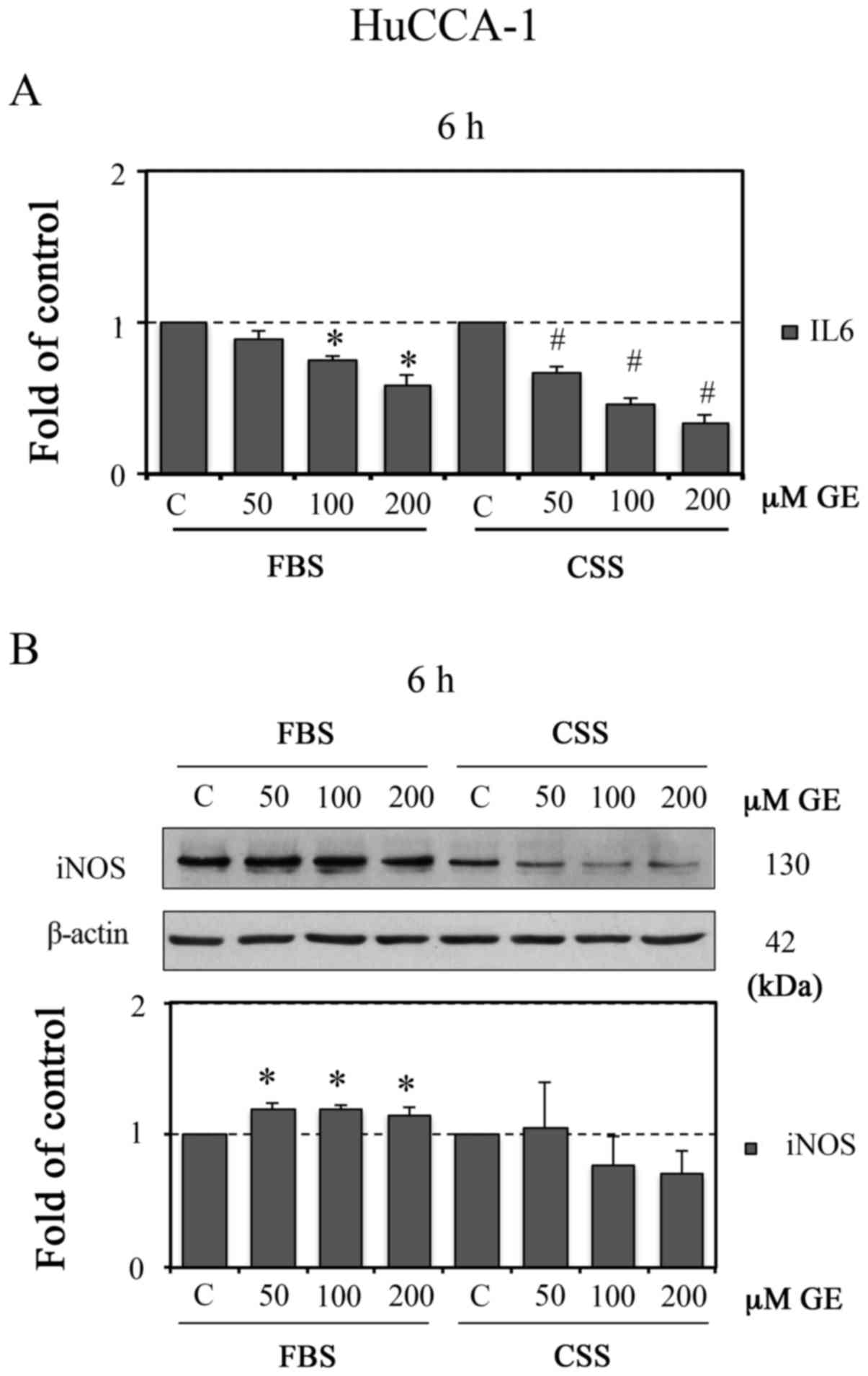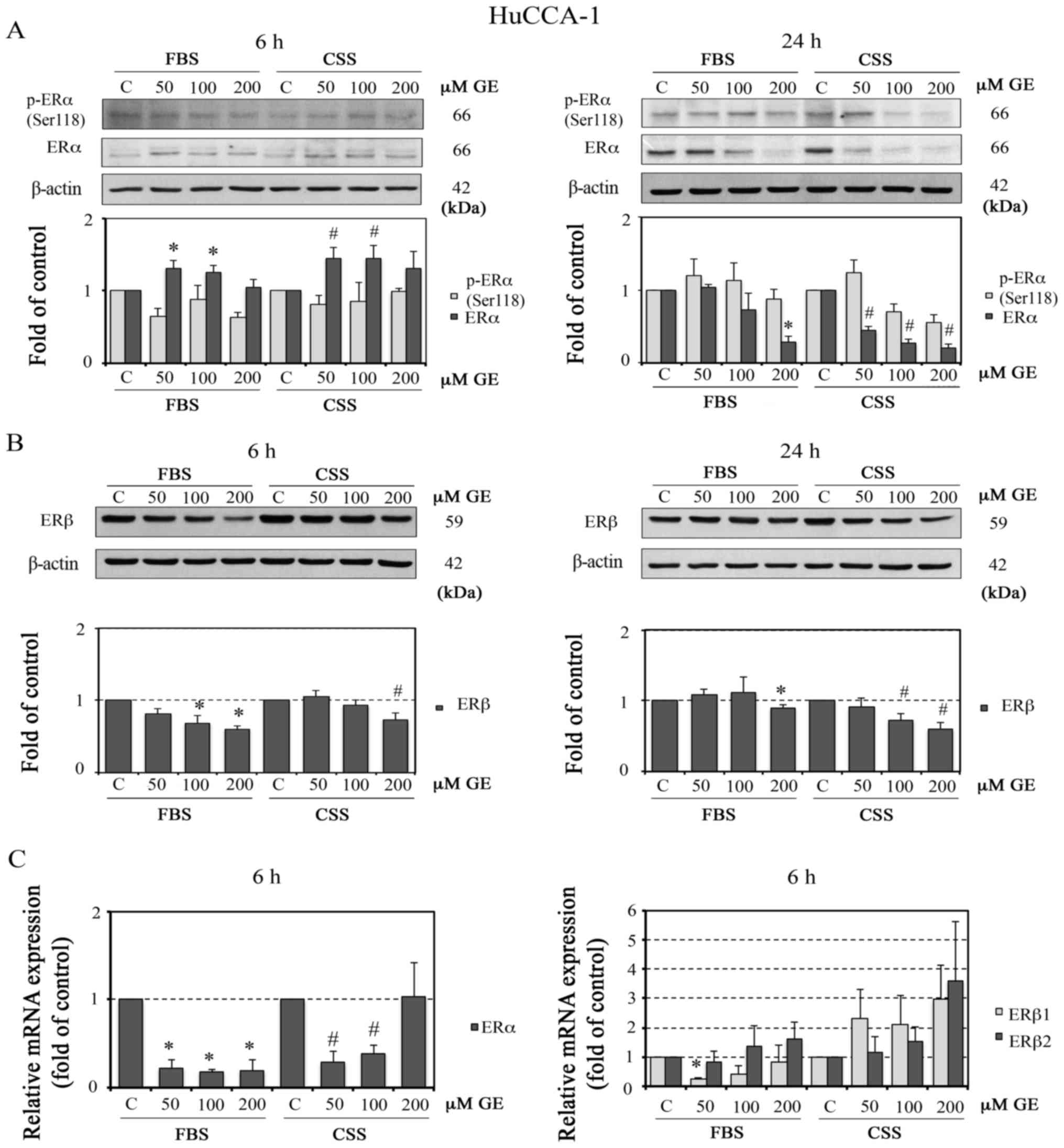|
1
|
Songserm N, Promthet S, Wiangnon S and
Sithithaworn P: Prevalence and co-infection of intestinal parasites
among thai rural residents at high-risk of developing
cholangiocarcinoma: A cross-sectional study in a prospective cohort
study. Asian Pac J Cancer Prev. 13:6175–6179. 2012. View Article : Google Scholar : PubMed/NCBI
|
|
2
|
Jaiswal M, LaRusso NF, Burgart LJ and
Gores GJ: Inflammatory cytokines induce Dells by a nitric
oxide-dependent mechanism. Cancer Res. 60:184–190. 2000.PubMed/NCBI
|
|
3
|
Sripa B, Thinkhamrop B, Mairiang E, Laha
T, Kaewkes S, Sithithaworn P, Periago MV, Bhudhisawasdi V,
Yonglitthipagon P, Mulvenna J, et al: Elevated plasma IL-6
associates with increased risk of advanced fibrosis and
cholangiocarcinoma in individuals infected by Opisthorchis
viverrini. PLoS Negl Trop Dis. 6:e16542012. View Article : Google Scholar : PubMed/NCBI
|
|
4
|
Kobayashi S, Werneburg NW, Bronk SF,
Kaufmann SH and Gores GJ: Interleukin-6 contributes to Mcl-1
up-regulation and TRAIL resistance via an Akt-signaling pathway in
cholangiocarcinoma cells. Gastroenterology. 128:2054–2065. 2005.
View Article : Google Scholar : PubMed/NCBI
|
|
5
|
Meng F, Henson R, Lang M, Wehbe H,
Maheshwari S, Mendell JT, Jiang J, Schmittgen TD and Patel T:
Involvement of human micro-RNA in growth and response to
chemotherapy in human cholangiocarcinoma cell lines.
Gastroenterology. 130:2113–2129. 2006. View Article : Google Scholar : PubMed/NCBI
|
|
6
|
Yothaisong S, Thanee M, Namwat N,
Yongvanit P, Boonmars T, Puapairoj A and Loilome W: Opisthorchis
viverrini infection activates the PI3K/AKT/PTEN and Wnt/β-catenin
signaling pathways in a Cholangiocarcinogenesis model. Asian Pac J
Cancer Prev. 15:10463–10468. 2014. View Article : Google Scholar
|
|
7
|
Ewald F, Nörz D, Grottke A, Hofmann BT,
Nashan B and Jücker M: Dual Inhibition of PI3K-AKT-mTOR- and
RAF-MEK-ERK-signaling is synergistic in cholangiocarcinoma and
reverses acquired resistance to MEK-inhibitors. Invest New Drugs.
32:1144–1154. 2014. View Article : Google Scholar : PubMed/NCBI
|
|
8
|
Yoon H, Min JK, Lee JW, Kim DG and Hong
HJ: Acquisition of chemoresistance in intrahepatic
cholangiocarcinoma cells by activation of AKT and extracellular
signal-regulated kinase (ERK)1/2. Biochem Biophys Res Commun.
405:333–337. 2011. View Article : Google Scholar
|
|
9
|
Kamsa-ard S, Wiangnon S, Suwanrungruang K,
Promthet S, Khuntikeo N, Kamsa-ard S and Mahaweerawat S: Trends in
liver cancer incidence between 1985 and 2009, Khon Kaen, Thailand:
Cholangiocarcinoma. Asian Pac J Cancer Prev. 12:2209–2213.
2011.
|
|
10
|
Alvaro D, Barbaro B, Franchitto A, Onori
P, Glaser SS, Alpini G, Francis H, Marucci L, Sterpetti P,
Ginanni-Corradini S, et al: Estrogens and insulin-like growth
factor 1 modulate neoplastic cell growth in human
cholangiocarcinoma. Am J Pathol. 169:877–888. 2006. View Article : Google Scholar : PubMed/NCBI
|
|
11
|
Shao W and Brown M: Advances in estrogen
receptor biology: Prospects for improvements in targeted breast
cancer therapy. Breast Cancer Res. 6:39–52. 2004. View Article : Google Scholar :
|
|
12
|
Guo RX, Wei LH, Tu Z, Sun PM, Wang JL,
Zhao D, Li XP and Tang JM: 17 β-estradiol activates PI3K/Akt
signaling pathway by estrogen receptor (ER)-dependent and
ER-independent mechanisms in endometrial cancer cells. J Steroid
Biochem Mol Biol. 99:9–18. 2006. View Article : Google Scholar : PubMed/NCBI
|
|
13
|
Nicholson RI, McClelland RA, Robertson JF
and Gee JM: Involvement of steroid hormone and growth factor
cross-talk in endocrine response in breast cancer. Endocr Relat
Cancer. 6:373–387. 1999. View Article : Google Scholar : PubMed/NCBI
|
|
14
|
Osborne CK, Shou J, Massarweh S and Schiff
R: Crosstalk between estrogen receptor and growth factor receptor
pathways as a cause for endocrine therapy resistance in breast
cancer. Clin Cancer Res. 11:865s–870s. 2005.PubMed/NCBI
|
|
15
|
Mancino A, Mancino MG, Glaser SS, Alpini
G, Bolognese A, Izzo L, Francis H, Onori P, Franchitto A,
Ginanni-Corradini S, et al: Estrogens stimulate the proliferation
of human cholangiocarcinoma by inducing the expression and
secretion of vascular endothelial growth factor. Dig Liver Dis.
41:156–163. 2009. View Article : Google Scholar :
|
|
16
|
Hunsawong T, Singsuksawat E, In-chon N,
Chawengrattanachot W, Thuwajit C, Sripa B, Paupairoj A, Chau-in S
and Thuwajit P: Estrogen is increased in male cholangiocarcinoma
patients' serum and stimulates invasion in cholangiocarcinoma cell
lines in vitro. J Cancer Res Clin Oncol. 138:1311–1320. 2012.
View Article : Google Scholar : PubMed/NCBI
|
|
17
|
Isse K, Specht SM, Lunz JG III, Kang LI,
Mizuguchi Y and Demetris AJ: Estrogen stimulates female biliary
epithelial cell interleukin-6 expression in mice and humans.
Hepatology. 51:869–880. 2010. View Article : Google Scholar : PubMed/NCBI
|
|
18
|
Sakla MS, Shenouda NS, Ansell PJ,
Macdonald RS and Lubahn DB: Genistein affects HER2 protein
concentration, activation, and promoter regulation in BT-474 human
breast cancer cells. Endocrine. 32:69–78. 2007. View Article : Google Scholar : PubMed/NCBI
|
|
19
|
Liu D, Yan L, Wang L, Tai W, Wang W and
Yang C: Genistein enhances the effect of cisplatin on the
inhibition of non-small cell lung cancer A549 cell growth in vitro
and in vivo. Oncol Lett. 8:2806–2810. 2014. View Article : Google Scholar : PubMed/NCBI
|
|
20
|
Yu Z, Li W and Liu F: Inhibition of
proliferation and induction of apoptosis by genistein in colon
cancer HT-29 cells. Cancer Lett. 215:159–166. 2004. View Article : Google Scholar : PubMed/NCBI
|
|
21
|
Ji G, Zhang Y, Yang Q, Cheng S, Hao J,
Zhao X and Jiang Z: Genistein suppresses LPS-induced inflammatory
response through inhibiting NF-κB following AMP kinase activation
in RAW 264.7 macrophages. PLoS One. 7:e531012012. View Article : Google Scholar
|
|
22
|
Verdrengh M, Jonsson IM, Holmdahl R and
Tarkowski A: Genistein as an anti-inflammatory agent. Inflamm Res.
52:341–346. 2003. View Article : Google Scholar : PubMed/NCBI
|
|
23
|
Gong L, Li Y, Nedeljkovic-Kurepa A and
Sarkar FH: Inactivation of NF-kappaB by genistein is mediated via
Akt signaling pathway in breast cancer cells. Oncogene.
22:4702–4709. 2003. View Article : Google Scholar : PubMed/NCBI
|
|
24
|
Gossner G, Choi M, Tan L, Fogoros S,
Griffith KA, Kuenker M and Liu JR: Genistein-induced apoptosis and
autophagocytosis in ovarian cancer cells. Gynecol Oncol. 105:23–30.
2007. View Article : Google Scholar : PubMed/NCBI
|
|
25
|
Sirisinha S, Tengchaisri T, Boonpucknavig
S, Prempracha N, Ratanarapee S and Pausawasdi A: Establishment and
charac-terization of a cholangiocarcinoma cell line from a Thai
patient with intrahepatic bile duct cancer. Asian Pac J Allergy
Immunol. 9:153–157. 1991.PubMed/NCBI
|
|
26
|
Rattanasinganchan P, Leelawat K,
Treepongkaruna SA, Tocharoentanaphol C, Subwongcharoen S,
Suthiphongchai T and Tohtong R: Establishment and characterization
of a cholangiocarcinoma cell line (RMCCA-1) from a Thai patient.
World J Gastroenterol. 12:6500–6506. 2006. View Article : Google Scholar : PubMed/NCBI
|
|
27
|
Milo GE, Malarkey WB, Powell JE, Blakeslee
JR and Yohn DS: Effects of steroid hormones in fetal bovine serum
on plating ang cloning of human cells in vitro. In Vitro. 12:23–30.
1976. View Article : Google Scholar : PubMed/NCBI
|
|
28
|
Wilson VS, Bobseine K and Gray LE Jr:
Development and characterization of a cell line that stably
expresses an estrogen-responsive luciferase reporter for the
detection of estrogen receptor agonist and antagonists. Toxicol
Sci. 81:69–77. 2004. View Article : Google Scholar : PubMed/NCBI
|
|
29
|
Nakareangrit W, Thiantanawat A,
Visitnonthachai D, Watcharasit P and Satayavivad J: Sodium arsenite
inhibited genomic estrogen signaling but induced pERα (Ser118) via
MAPK pathway in breast cancer cells. Environ Toxicol. 31:1133–1146.
2016. View Article : Google Scholar
|
|
30
|
Qin J, Teng J, Zhu Z, Chen J and Huang WJ:
Genistein induces activation of the mitochondrial apoptosis pathway
by inhibiting phosphorylation of Akt in colorectal cancer cells.
Pharm Biol. 54:74–79. 2016. View Article : Google Scholar
|
|
31
|
Yoon JH, Gwak GY, Lee HS, Bronk SF,
Werneburg NW and Gores GJ: Enhanced epidermal growth factor
receptor activation in human cholangiocarcinoma cells. J Hepatol.
41:808–814. 2004. View Article : Google Scholar : PubMed/NCBI
|
|
32
|
Akiyama T, Ishida J, Nakagawa S, Ogawara
H, Watanabe S, Itoh N, Shibuya M and Fukami Y: Genistein, a
specific inhibitor of tyrosine-specific protein kinases. J Biol
Chem. 262:5592–5595. 1987.PubMed/NCBI
|
|
33
|
Tadlock L and Patel T: Involvement of p38
mitogen-activated protein kinase signaling in transformed growth of
a cholangiocarcinoma cell line. Hepatology. 33:43–51. 2001.
View Article : Google Scholar
|
|
34
|
Braconi C, Swenson E, Kogure T, Huang N
and Patel T: Targeting the IL-6 dependent phenotype can identify
novel therapies for cholangiocarcinoma. PLoS One. 5:e151952010.
View Article : Google Scholar : PubMed/NCBI
|
|
35
|
Fritz WA, Wang J, Eltoum IE and
Lamartiniere CA: Dietary genistein down-regulates androgen and
estrogen receptor expression in the rat prostate. Mol Cell
Endocrinol. 186:89–99. 2002. View Article : Google Scholar : PubMed/NCBI
|
|
36
|
Haldosén LA, Zhao C and Dahlman-Wright K:
Estrogen receptor β in breast cancer. Mol Cell Endocrinol.
382:665–672. 2014. View Article : Google Scholar
|
|
37
|
Razumilava N and Gores GJ:
Cholangiocarcinoma. Lancet. 383:2168–2179. 2014. View Article : Google Scholar : PubMed/NCBI
|
|
38
|
Traganos F, Ardelt B, Halko N, Bruno S and
Darzynkiewicz Z: Effects of genistein on the growth and cell cycle
progression of normal human lymphocytes and human leukemic MOLT-4
and HL-60 cells. Cancer Res. 52:6200–6208. 1992.PubMed/NCBI
|
|
39
|
Nakamura Y, Tsuji S and Tonogai Y:
Determination of the levels of isoflavonoids in soybeans and
soy-derived foods and estimation of isoflavonoids in the Japanese
daily intake. J AOAC Int. 83:635–650. 2000.PubMed/NCBI
|
|
40
|
Leelawat K, Narong S, Udomchaiprasertkul
W, Leelawat S and Tungpradubkul S: Inhibition of PI3K increases
oxaliplatin sensitivity in cholangiocarcinoma cells. Cancer Cell
Int. 9:32009. View Article : Google Scholar : PubMed/NCBI
|
|
41
|
Yoshikawa D, Ojima H, Iwasaki M, Hiraoka
N, Kosuge T, Kasai S, Hirohashi S and Shibata T:
Clinicopathological and prognostic significance of EGFR, VEGF, and
HER2 expression in cholangiocarcinoma. Br J Cancer. 98:418–425.
2008. View Article : Google Scholar
|
|
42
|
Yoshikawa D, Ojima H, Kokubu A, Ochiya T,
Kasai S, Hirohashi S and Shibata T: Vandetanib (ZD6474), an
inhibitor of VEGFR and EGFR signalling, as a novel
molecular-targeted therapy against cholangiocarcinoma. Br J Cancer.
100:1257–1266. 2009. View Article : Google Scholar : PubMed/NCBI
|
|
43
|
Jiang L, Jiang LS, Yan LN, Li FY, Wang W,
Cheng NS and Wen TF: Effects of epidermal growth factor receptor
inhibitor genistein on proliferative cholangitis in rats. J Surg
Res. 162:59–67. 2010. View Article : Google Scholar
|
|
44
|
Uckun FM, Narla RK, Jun X, Zeren T,
Venkatachalam T, Waddick KG, Rostostev A and Myers DE: Cytotoxic
activity of epidermal growth factor-genistein against breast cancer
cells. Clin Cancer Res. 4:901–912. 1998.PubMed/NCBI
|
|
45
|
Roberts PJ and Der CJ: Targeting the
Raf-MEK-ERK mitogen-activated protein kinase cascade for the
treatment of cancer. Oncogene. 26:3291–3310. 2007. View Article : Google Scholar : PubMed/NCBI
|
|
46
|
Huang X, Chen S, Xu L, Liu Y, Deb DK,
Platanias LC and Bergan RC: Genistein inhibits p38 map kinase
activation, matrix metalloproteinase type 2, and cell invasion in
human prostate epithelial cells. Cancer Res. 65:3470–3478. 2005.
View Article : Google Scholar : PubMed/NCBI
|
|
47
|
Wang X, Martindale JL and Holbrook NJ:
Requirement for ERK activation in cisplatin-induced apoptosis. J
Biol Chem. 275:39435–39443. 2000. View Article : Google Scholar : PubMed/NCBI
|
|
48
|
Li Z, Li J, Mo B, Hu C, Liu H, Qi H, Wang
X and Xu J: Genistein induces G2/M cell cycle arrest via stable
activation of ERK1/2 pathway in MDA-MB-231 breast cancer cells.
Cell Biol Toxicol. 24:401–409. 2008. View Article : Google Scholar : PubMed/NCBI
|
|
49
|
Bishnupuri KS, Luo Q, Murmu N, Houchen CW,
Anant S and Dieckgraefe BK: Reg IV activates the epidermal growth
factor receptor/Akt/AP-1 signaling pathway in colon
adenocarcinomas. Gastroenterology. 130:137–149. 2006. View Article : Google Scholar : PubMed/NCBI
|
|
50
|
Zhu XF, Liu ZC, Xie BF, Li ZM, Feng GK,
Yang D and Zeng YX: EGFR tyrosine kinase inhibitor AG1478 inhibits
cell proliferation and arrests cell cycle in nasopharyngeal
carcinoma cells. Cancer Lett. 169:27–32. 2001. View Article : Google Scholar : PubMed/NCBI
|
|
51
|
Wei Z, Song X and Shaikh ZA: Cadmium
promotes the proliferation of triple-negative breast cancer cells
through EGFR-mediated cell cycle regulation. Toxicol Appl
Pharmacol. 289:98–108. 2015. View Article : Google Scholar : PubMed/NCBI
|
|
52
|
Treekitkarnmongkol W and Suthiphongchai T:
High expression of ErbB2 contributes to cholangiocarcinoma cell
invasion and proliferation through AKT/p70S6K. World J
Gastroenterol. 16:4047–4054. 2010. View Article : Google Scholar : PubMed/NCBI
|
|
53
|
Frampton G, Invernizzi P, Bernuzzi F, Pae
HY, Quinn M, Horvat D, Galindo C, Huang L, McMillin M, Cooper B, et
al: Interleukin-6-driven progranulin expression increases
cholangiocarcinoma growth by an Akt-dependent mechanism. Gut.
61:268–277. 2012. View Article : Google Scholar
|
|
54
|
Shou J, Massarweh S, Osborne CK, Wakeling
AE, Ali S, Weiss H and Schiff R: Mechanisms of tamoxifen
resistance: Increased estrogen receptor-HER2/neu cross-talk in
ER/HER2-positive breast cancer. J Natl Cancer Inst. 96:926–935.
2004. View Article : Google Scholar : PubMed/NCBI
|
|
55
|
Levin ER: Bidirectional signaling between
the estrogen receptor and the epidermal growth factor receptor. Mol
Endocrinol. 17:309–317. 2003. View Article : Google Scholar : PubMed/NCBI
|
|
56
|
Marzioni M, Torrice A, Saccomanno S,
Rychlicki C, Agostinelli L, Pierantonelli I, Rhönnstad P, Trozzi L,
Apelqvist T, Gentile R, et al: An oestrogen receptor β-selective
agonist exerts anti-neoplastic effects in experimental intrahepatic
cholangiocarcinoma. Dig Liver Dis. 44:134–142. 2012. View Article : Google Scholar
|
|
57
|
Gores GJ: Cholangiocarcinoma: Current
concepts and insights. Hepatology. 37:961–969. 2003. View Article : Google Scholar : PubMed/NCBI
|
|
58
|
Naugler WE, Sakurai T, Kim S, Maeda S, Kim
K, Elsharkawy AM and Karin M: Gender disparity in liver cancer due
to sex differences in MyD88-dependent IL-6 production. Science.
317:121–124. 2007. View Article : Google Scholar : PubMed/NCBI
|
|
59
|
Johnson C, Han Y, Hughart N, McCarra J,
Alpini G and Meng F: Interleukin-6 and its receptor, key players in
hepatobiliary inflammation and cancer. Transl Gastrointest Cancer.
1:58–70. 2012.PubMed/NCBI
|
|
60
|
Park J, Tadlock L, Gores GJ and Patel T:
Inhibition of interleukin 6-mediated mitogen-activated protein
kinase activation attenuates growth of a cholangiocarcinoma cell
line. Hepatology. 30:1128–1133. 1999. View Article : Google Scholar : PubMed/NCBI
|
|
61
|
Hämäläinen M, Nieminen R, Vuorela P,
Heinonen M and Moilanen E: Anti-inflammatory effects of flavonoids:
Genistein, kaempferol, quercetin, and daidzein inhibit STAT-1 and
NF-kappaB activations, whereas flavone, isorhamnetin, naringenin,
and pelargonidin inhibit only NF-kappaB activation along with their
inhibitory effect on iNOS expression and NO production in activated
macrophages. Mediators Inflamm. 2007:456732007. View Article : Google Scholar
|
|
62
|
Nakaya M, Tachibana H and Yamada K:
Isoflavone genistein and daidzein up-regulate LPS-induced inducible
nitric oxide synthase activity through estrogen receptor pathway in
RAW264.7 cells. Biochem Pharmacol. 71:108–114. 2005. View Article : Google Scholar : PubMed/NCBI
|
|
63
|
Kuiper GG, Lemmen JG, Carlsson B, Corton
JC, Safe SH, van der Saag PT, van der Burg B and Gustafsson JA:
Interaction of estrogenic chemicals and phytoestrogens with
estrogen receptor β. Endocrinology. 139:4252–4263. 1998. View Article : Google Scholar : PubMed/NCBI
|
|
64
|
Manas ES, Xu ZB, Unwalla RJ and Somers WS:
Understanding the selectivity of genistein for human estrogen
receptor-β using X-ray crystallography and computational methods.
Structure. 12:2197–2207. 2004. View Article : Google Scholar : PubMed/NCBI
|















